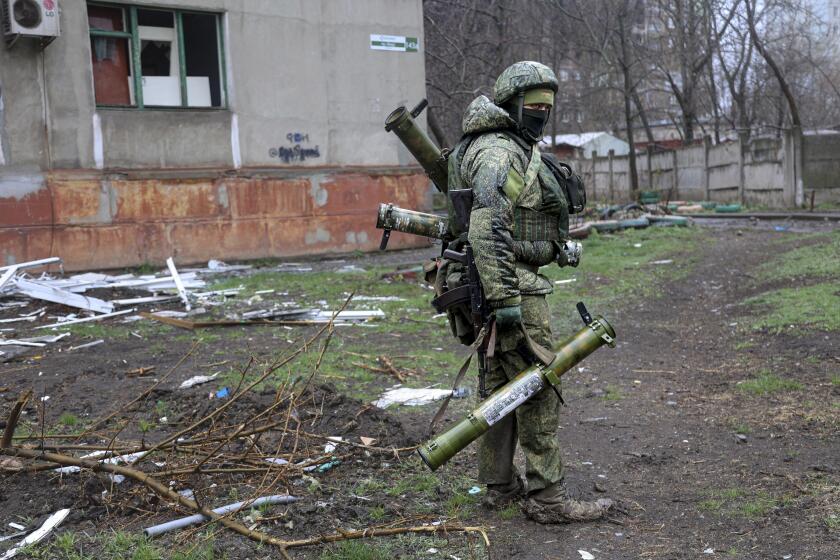Biden announces another $800 million in Ukraine defense aid

Biden says the U.S. will send another $800 million in defense aid to Ukraine, where Russia pushes to overtake the eastern part of the country.
- Share via
WASHINGTON — President Biden on Thursday announced that the U.S. will send Ukraine another $800 million in security assistance to help it stave off Russia’s renewed offensive in the country’s eastern Donbas region, sending a strong message to Moscow that the West intends to stay in the fight for as long as it takes.
The tranche of defense aid, which follows a similar $800-million package last week, will include more heavy artillery and offensive weaponry that Ukrainian President Volodymyr Zelensky has requested as the war shifts into a ground conflict that could go on for months.
The package brings the total amount of U.S. defense assistance for Ukraine since the war began to $3.4 billion, a sign of the Biden administration’s desire to see the eastern European democracy survive Russia’s unprovoked assault.
“We’re not sitting on the funding that Congress has provided for Ukraine. We’re sending it directly to the front lines of freedom,” Biden said in a speech from the White House during which he also announced the U.S. would provide Ukraine with an additional $500 million in humanitarian aid. “We are in a critical window now of time when they’re going to set the stage for the next phase of war.”
Biden, who said the U.S. believes the besieged city of Mariupol has not completely fallen into Russian hands, spoke following a meeting with Ukrainian Prime Minister Denis Shmyhal, who also met with congressional leaders Thursday.
Although Biden departed the White House shortly after announcing the additional Ukraine aid to embark on a two-day Pacific Northwest swing focused on domestic issues, the president’s remarks made clear just how much the ongoing war continues to be a major focus for his administration, Congress and the country.
The latest military assistance, he said, includes “dozens” of howitzers and 144,000 rounds of ammunition for the long-range ground weapons, as well as more than 100 additional tactical drones.
Biden, however, said he’s “exhausted” his drawdown authority to approve more aid for Ukraine and planned to ask Congress next week to expand his ability to continue to send assistance. He also announced that the U.S. was banning any Russian ships from American ports.
He said that Russian President Vladimir Putin appears to be betting that the West will lose its focus and resolve as the war drags on and vowed that “we’re going to prove him wrong.”
He continued: “We will not lessen our resolve. We’re going to continue to stand with the brave and proud people of Ukraine. We will never fail in our determination to defend freedom and oppose tyranny. It’s as simple as that.”
Although the U.S. says it’s committed for the long haul, there’s no evidence it has a plan to shorten or help Ukraine in what’s shaping up to become a protracted conflict.
After responding initially to Putin’s invasion primarily with economic sanctions, which the U.S. and its NATO allies have continued to ratchet up, Biden and other NATO leaders have shown a growing willingness to arm Ukraine as it has become clear the war could be a prolonged one.
“This is our responsibility, it seems to me,” he said. Asked how long the U.S. can realistically sustain Ukraine’s war, Biden said the U.S. and NATO can do it for “a long time” if the alliance remains unified in its response to Russian aggression.
Ukraine’s resilience in battle has come as something of a surprise, as has Zelensky’s remarkable effectiveness in using Western media to rally global support for his country’s cause. Zelensky’s efforts have prompted the leaders of the world’s largest democracies to back up their rhetoric with action.
Biden lauded the media for reporting from the front lines that has revealed countless atrocities against Ukrainian civilians, further hardening the West’s resolve; and he credited the Pentagon’s sharing of real-time intelligence with Ukraine’s military and other defense aid efforts that, for security reasons, have been kept under wraps.
“Sometimes you have to speak softly and carry a large Javelin,” Biden said, updating Teddy Roosevelt’s famed foreign policy maxim from more than a century ago.
Ukraine’s government rejected the Russian assertion of a complete takeover of the once-thriving coastal city, which has been nearly wiped out.
The new willingness to send Ukraine helicopters, drones and fighter jets marks a shift away from the West’s response in the war’s first month when the U.S. scotched a proposal to help facilitate the transfer of Soviet era MiG-29 jets from Poland to Ukraine out of concern that Putin would see the move as escalatory.
As the the U.S. and its allies have made the scope of their defense aid clearer in recent days, Putin on Wednesday delivered another ominous and explicit threat after testing a new Russian intercontinental ballistic missile, stating that it should give other countries “food for thought” about arming Ukraine.
Although Biden has ruled out sending U.S. troops to Ukraine, explaining that any direct engagement with Russia would lead to “World War III” with a nuclear power, the White House this week largely brushed off Putin’s missile test and comments as bluster.
“We did not deem the test a threat to the United States or its allies,” Jen Psaki, the White House press secretary, said Wednesday. “And the timing of the scope of Russia’s missile tests do not influence our approach to countering Russia’s further invasion of Ukraine.”
More to Read
Get the L.A. Times Politics newsletter
Deeply reported insights into legislation, politics and policy from Sacramento, Washington and beyond. In your inbox three times per week.
You may occasionally receive promotional content from the Los Angeles Times.













